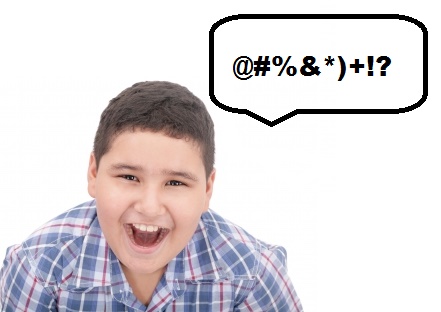Why do kids and teens cuss and what can we do about it effectively? Here are a couple of reasons and some suggestions on what you can do about it. These suggestions may not be appropriate for all children, all families or all situations. They are simply suggestions that you might be able to use, depending on your situation with your kids.
The image is courtesy of FreeDigitalPhotos.com and David Castillo DominiciIs it a learned behavior?
It may be a learned behavior. Children learn by watching, listening and experimenting. If they are exposed to inappropriate language, it is sometimes normal for them to try it out themselves as experimentation. If they get a big reaction from others around them, it could motivate them to repeat it. Oftentimes, young children aren’t really sure what the words mean, they just like the reaction it brings on.
For starters, be sure that your children are not being exposed to inappropriate movies, music or video games. Also be sure that your children are not witnessing abusive interactions between those involved in unhealthy relationships. This experience for them can teach them that bad behavior and bad language are both acceptable.
Is it related to an unmet need?
It may be a sign of an unmet need. In addition to basic survival needs such as food, water, sleep, and medical care, children have a series of higher level needs such as love, attention, power and safety. If these needs aren’t being met, a child could adopt inappropriate behaviors as attempts to get these needs met. In other words, a child who is not getting an adequate amount of love and attention by use cussing to get any attention they can.
Is it a means of communication?
If your child is intentionally using bad language, ask yourself, “What could my child be trying to tell me by using those words?” Could she be doing it because she is angry about a change in the family? Has there been a divorce or a death involving any of her caregivers? Does she get plenty of opportunities that help satisfy her need to feel important and valuable to you?
Is it a means of getting your attention?
Ask yourself, “How is my relationship with my child? Have I been too busy for him, or have I been distracted, distant or angry? Have I been yelling and punishing too much?” If any of these conditions currently exist, the child’s use of cuss words maybe garnering him inappropriate attention from you by getting you to react. Negative attention is better than no attention at all.
What can you do?
If your child has picked up bad language from a playmate, limit play time with that other child or increase supervision when they are together. If your child has learned it somewhere else, limit his or her exposure to that source. And if it’s a sign that your relationship with your child is lacking, spend more undistracted and quality time with your child. More often than not, a child’s challenging behavior is actually communication.
Whether you’ve found the source or not, create moments of closeness with your child to talk about the cussing. State your position that the words they are using are not acceptable to you and are not allowed in the family. Without too much ‘drilling,’ ask them why they use those words. Work cooperatively with them to come up with other words they can use instead.
Finally, be calm, patience and loving. Be sure that you are setting a good example. Click to view a video to see one powerful way of stopping cussing.
Bill Corbett has a degree in clinical psychology and is the author of the award winning book “Love, Limits, & Lessons: A Parent’s Guide to Raising Cooperative Kids,” in English and in Spanish. He is happily married with three grown children, two grandchildren, and three step children. You can visit his Web site www.CooperativeKids.com for further information and parenting advice.



Leave a Reply